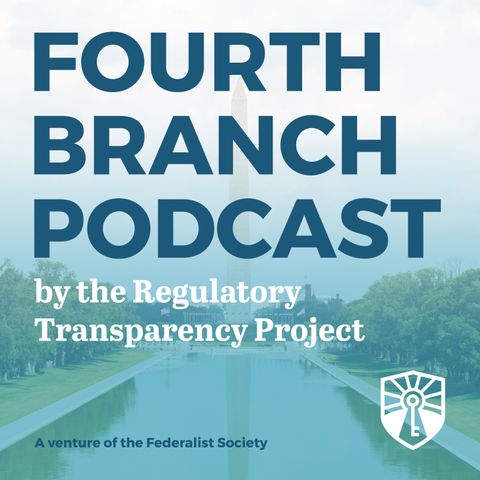
Contacts
Info
The Regulatory Transparency Project is a nonprofit, nonpartisan effort dedicated to fostering discussion and a better understanding of regulatory policies. On RTP’s Fourth Branch Podcast, leading experts discuss the pros...
show moreOn RTP’s Fourth Branch Podcast, leading experts discuss the pros and cons of government regulations and explain how they affect everyday life for Americans.

RTP's Fourth Branch Podcast
RTP's Fourth Branch Podcast
Deep Dive 292 - Utah v. Su: Are DOL (and SEC) regulations that encourage ESG investing lawful?
Explainer 69 - Discussing the Anti-Semitism Awareness Act
Explainer 68 - Discussing the Pregnant Workers Fairness Act
Deep Dive 291 - Assessing the Federal Data Privacy Landscape: A discussion of the American’s Privacy Rights Act
Explainer 67 - Veterans' Benefits Reforms How Healthcare Influences Foreign Policy
Deep Dive 290 - A Discussion on the Biden Administration’s New Title IX Regulations
Explainer 66 - Strategic Petroleum Reserve
Explainer 65 - Reviewing Michael Cannon's Book "Recovery"
Deep Dive 289 - Grading the Biden DOL and NLRB’s Use of Regulatory Authorities
Courthouse Steps Oral Argument: Murthy v. Missouri
The Regulatory Transparency Project is a nonprofit, nonpartisan effort dedicated to fostering discussion and a better understanding of regulatory policies. On RTP’s Fourth Branch Podcast, leading experts discuss the pros...
show moreOn RTP’s Fourth Branch Podcast, leading experts discuss the pros and cons of government regulations and explain how they affect everyday life for Americans.
Information
| Author | The Federalist Society |
| Organization | The Federalist Society |
| Categories | Politics |
| Website | regproject.org |
| rtp@regproject.org |
Copyright 2024 - Spreaker Inc. an iHeartMedia Company
